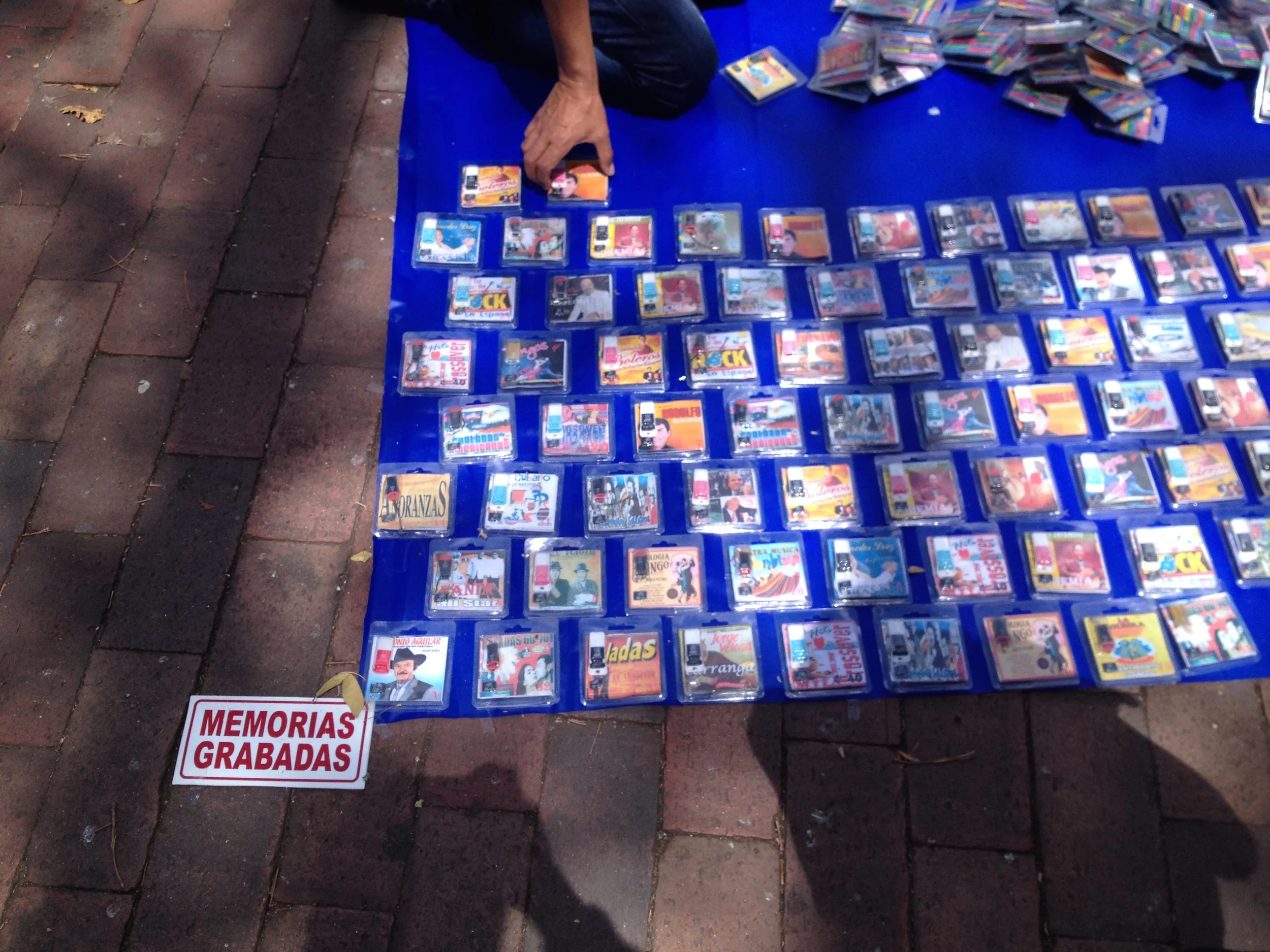TECHNOLOGY AS A VECTOR
Viruses spread with the help of vector agents. In biological viruses the most common ones are mosquitos that carry Malaria, and Dengue within them and transfer it to another organism with a bite. In regards to digital viruses, it is usual that they attach to programs that run them every time they are open, and also commonly used Floppy Disks and USB sticks as vectors. Technology carries lots of meanings and information and it can be used as a vector for getting an idea from A to B and infect new organisms.
USB vectors that spread digital content in a physical form
The creativity and vision of the people from the Tropics have no limits. Aware of the ‘attractiveness’ of the entertainment business, they developed quickly piracy alternatives. This is an art that has been polished over the years and show more dynamism than the strategies from big corporate multinationals. Latino Pirates, in specific those from the buzzing streets from Bogotá and Medellin, in Colombia, realized long time ago that the CD ROM format was coming to an imminent death. It was once the favorite format for copying music, movies, and video games but since a couple of years ago, it has been replaced by digital-online alternatives that were slowly discouraging the use of compact disc. Many blame the MP3s and iPods for example. Today you can still see colorful stands with sellers yelling on the streets, and still selling music but now on USB sticks. These flash drives are pre uploaded with albums and playlists and packaged inside interesting plastic bags with an artwork cover as CD’s had. They function directly when connected to sound systems and computers. But these vendors don’t only sell music, they also offer movies and even ebooks! And all of them inside a USB stick. This format has positioned itself as one of the preferred offline file sharing alternatives. While music and film content has been offered to be consumed via streaming, computer manufacturers seem to have reduced the production of machines with CD ROM drives. On the other side of the coin, USB ports have been applied in many devices that didn’t had them before as TVs and sound systems, so that they could easily play digital content. Thus USB sticks turned out to be a practical and cheap alternative for the distribution of digital content in a physical form.
Sand, sun and cocktails. Sounds like paradise for many people but there are always conflicts when thinking about Cuba. Many things are luxury for Cubans, and Internet access is one of them. Many people posses mobile phones even when they can hardly afford sms. With computers is a similar story where Internet is expensive for tourists and almost inexistent for Cubans. Only 5% of the population have access to internet and an hour of it in internet cafés is sold for $5, which is what an average Cuban earn in a week. In reaction to that, the Cuban youth has created a alternative Internet by connecting a big range of computers via local networks.
This situation has also made that many online activities have an offline translation.
In the recent years the cuban blogosphere has bloomed but they can’t still reach their own people. In response to that, flash drives were considered as a way of offline distribution for blogs like Periodismo de Barrio which has also its online version. This Weekly Packet in USB sticks are offered in small business and drop their price as the days passes. When acquired people connect those external drives to their computers or TVs and content pops up automatically. The interesting thing here is that this not only a blog but more like a vlog, a video blog where several topics are covered with strong focus on natural disasters.
ECOSYSTEM
Piracy is a phenomena that has been there for a while. Selling copies of products, mainly in music, film and books. The preferred Piracy medium, the CD ROM, was soon turning obsolete. USB ports where positionating itself as a universal source of power and data exchange.
Need
People needed a practical easy to use container of digital content that could work in any device. An exchangeable medium that exploits physicality and enable content flow without touching a computer.
Dynamic
People started spontaneously offering on the streets books, record albums, and movies in preloaded USB Sticks. This memories keep having an artwork cover and a special case as CD ROMs had. Those flash drives carry any digital content and reproduce it automatically when connected to a TV, a sound system or a computer.
New Service / Product / Interaction
A new way of physical distribution of digital content was found. People don't even need to posses or access a computer since this content can be played in other devices.
New Meaning
USB Sticks as containers of content for physical exchange
Technology
USB Sticks










